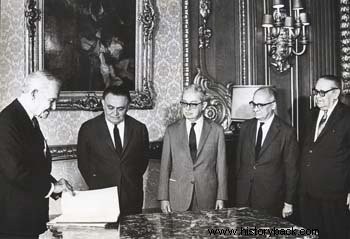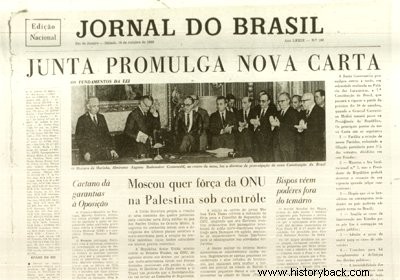The Constitution of 1967 it was the 4th Brazilian Magna Carta and the third of the republican period.
The Constitution, drafted during the military regime, entered into force on March 15, 1967.
Historical Context

Jurists responsible for the draft of the new Constitution deliver the preliminary version to President Castelo Branco in
08/19/1966. from left to the right:Levi Carneiro, Castelo Branco, Temístocles Cavalcanti, Orozimbo Nonato and the Minister of Justice Medeiros da Silva
In the 1960s, a series of military coups overthrew democratic regimes in Latin America. The fear that communism would settle on the continent after the Cuban Revolution made the United States directly or indirectly support a series of military governments in the region.
The Brazilian right and the military came together to overthrow President João Goulart. Accused of wanting to implant international communism in the country, the president was deposed on April 1, 1964, giving rise to the military dictatorship that would only end in 1985.
Read about João Goulart and the Military Dictatorship in Brazil.
Elaboration of the Constitution of 1967
Unlike some dictatorships, the Brazilian military regime wanted to give an appearance of normality and the National Congress was kept open for two years.
Despite the military and the civilians who supported them dominating the political scene, the government wanted to make a new Magna Carta. With this, they intended to incorporate the Institutional Acts that have been published since 1964.
In 1966, the government published a draft Constitution written by the Minister of Justice, Carlos Medeiros Silva, and by jurists Francisco Campos, Levi Carneiro, Temístocles Cavalcanti and Orozimbo Nonato.
However, in the face of the protest made by the MDB (opposition) and by Arena, the government reopens and convenes Congress to discuss and vote on the new Magna Carta, between December 12, 1966 and January 24, 1967.
The final text would be approved without many changes by the deputies and senators. As this Constitution was not drafted by a Constituent Assembly, many authors claim that it was enacted. However, other scholars claim that approval by the National Congress would be enough to characterize it as enacted.
Characteristics of the 1967 Constitution

Cover of Jornal do Brasil on March 16, 1967.
Within the logic of the Cold War, the constitutional text privileged themes such as national security, the increase in the powers of the Union and the President of the Republic. It also incorporated the reduction of individual autonomy and the suspension of constitutional rights and guarantees by the State.
It maintained the Republic as a form of government and Brasília continued to be the federal capital.
Although it maintained the separation of the three powers – Executive, Legislative and Judiciary – the decision-making power was concentrated in the Executive Branch. Institutional Act nº1, nº2 and nº3 that had governed the country until that moment were also incorporated.
Thus, the main points of the Constitution of 1967 were:
- The president was elected indirectly, by an Electoral College, in public session, for a term of four years.
- cassification and suspension of political rights by the Executive Branch,
- established bipartisanship,
- determined indirect elections for governors and mayors,
- instituted the death penalty for crimes against national security,
- restricted the right to strike,
- increased military justice, extending special jurisdiction to civilians.
Later, in 1968, the AI-5 was incorporated, which determined:
- The closure of Congress by the Executive Branch,
- prior censorship of the media,
- military intervention in states and municipalities,
- suspension of civil and political rights of citizens, who committed crimes against National Security.
End of the 1967 Constitution
The 1967 Constitution was repealed when military rule ended.
In 1986 the deputies were elected who formed the Constituent Assembly and formulated the new Magna Carta in accordance with the new restored democratic regime.
Learn more:
- Redemocratization of Brazil
- Constitution of 1988
- Freedom of Expression
- Amnesty Law
- Questions about the Military Dictatorship
